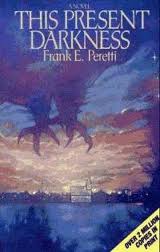Story Evangelism: The Gospel Has Power In Realistic Fiction
From Story Evangelism: Top Myths About Christian Novels, E. Stephen Burnett:
The first myth may be that Christian stories spend all or most of their time John 3:16-ing the reader. No, they don’t.
Evidence? I think we agree that Frank Peretti’s novels—the angels-and-demons-and-men kind—are awesome. That’s not because those stories do not include the gospel preached. Of course they do. But in the Perettiverse the gospel is 100 percent assumed. God is real. Jesus lived, died, and resurrected. Angels are real. Demons are real and can get you.
The entire story is “evangelizing” you by presuming this is the state of reality.
 In my reading experience, it’s not the content that matters but the presentation.
In my reading experience, it’s not the content that matters but the presentation.
The laws of storytelling, while malleable and subjective to a certain extent, are in their essence neither arbitrary nor inconsequential.
One of those laws is that character action must be realistically motivated. Convincing character motivation can elevate even the most banal content to greatness (think of Gladiator or John Wick — simple revenge tales with the power to move us), and, as has been proven repeatedly by the Kendrick Brothers and others, even the most spectacular and poignant story in history — the gospel — can easily be stripped of its luster if characters approach it in unrealistic ways.
In other words, it’s not the Conversion Scene™ or the Relevant Cultural Commentary™ that make a novel stilted; it’s the presumption on the part of a writer that such content carries automatic significance in the minds of readers. It’s the belief that the gospel — or some Biblical Principle™ — is powerful enough to melt hearts and change minds all on its own, that all one need do is present it to readers.
 But this is the logic of preaching, not of storytelling. Stories are full of supposedly-real people, and real people rarely identify truth through intuition.
But this is the logic of preaching, not of storytelling. Stories are full of supposedly-real people, and real people rarely identify truth through intuition.
You mentioned Peretti’s Darkness novels as examples of well-integrated spirituality — of “message-grade” content that doesn’t feel shoehorned in as a prop for a rickety plot. This is true. Though Peretti doesn’t always manage to pull it off without flaw, he’s certainly one of the most effective contemporary practitioners of the properly-motivated “Christian” spec-fic message-novel.
The example I’ll cite comes from The Oath, one of his standout works (spoilers follow). The story takes place in a remote Northwest logging town (what with Peretti’s popularity, I’m surprised anyone still visits my region of the country) haunted by a vengeful dragon. Yes, dragon. Breathes fire and everything. Our heroes are outsiders who arrive to hunt the thing, but eventually fall under its power. You see, the dragon is a personification of sin. And when our heroes end up fornicating together, they relinquish their spiritual immunity. And then the hunters become the hunted and yes, if this sounds very much like an allegory it’s because that’s exactly what it is. (Confession time: I secretly love allegories.) And then there’s a desperate conversion scene heading into the final furious confrontation.
The content seems cheesy, no? But it’s not. And the difference is in the telling. The characters act naturally. When they sin, it seems only natural. When they repent, it’s because they’re terrified of their sin’s consequences. The Conversion Scene™, far from feeling obligatory, is an essential plot element without which the whole story would collapse. It’s only in there ’cause it’s motivated.
(Note: it’s not necessarily the novel’s fault that fornication, being super-stigmafied in Christian culture, doesn’t exactly catch the reader by surprise as an in-world strategic misstep. What *The Oath* lacks in subtlety it kinda makes up for with symbolic clarity. But I certainly would’ve preferred that a less-obvious sin necessitate our hero’s repentance — something like idolatry or covetousness or false witness.)
 For another exemplary exhibit, let’s return to the well. In The Lord of the Rings, when Frodo the Ringbearer — who’s been assaulted day and night by the lure of the Ring of Power — at last stands before the Crack of Doom, what happens? He falls. He cracks beneath the strain, caving in to temptation, and Middle-earth is saved in that moment only through the providential intervention of another ringbearer in thrall to sin.
For another exemplary exhibit, let’s return to the well. In The Lord of the Rings, when Frodo the Ringbearer — who’s been assaulted day and night by the lure of the Ring of Power — at last stands before the Crack of Doom, what happens? He falls. He cracks beneath the strain, caving in to temptation, and Middle-earth is saved in that moment only through the providential intervention of another ringbearer in thrall to sin.
I contend that this is not only the highest and best drama of Tolkien’s legendarium, but the make-or-break moment that determines the realism of the entire plot. If Frodo hadn’t been revealed to be fallible, the story would’ve been about his cardboard endurance, his flawless heroism, his unreal perfection. He would’ve morphed from a living character under the influence of real pain and temptation, into a plot device intended to exhibit a lesson. By breaking Frodo, by marring his “usefulness,” Tolkien erases the moral gap between character and reader. Only then do Frodo’s prior struggles against sin take on the fullness of the real world.
The point I’m making is this: content alone determines nothing. A gospel presentation or a conversion experience does not a good story make. Nor does it necessarily transform a story into mere propaganda. What makes the difference is character motivation. Do the characters act like recognizably real people? Or does the writer have such little faith in his own beliefs about God or morality that he feels it necessary to alter human nature itself in order to showcase said beliefs to an audience?
And now we arrive at the heart of the matter.
Isn’t the essential power of the gospel found in the fact that it works in the real world? The gospel is the power of God for salvation to everyone who believes (Rom. 1:16). It doesn’t require ideal people or picture-perfect circumstances or cringeworthy accommodation. We Christians don’t believe in a message that can’t survive exposure to reality; the gospel is the ultimate acknowledgement of reality — the exultant revelation of the world’s most painful secret (that we humans, left to our own devices, are lost and depraved) and its deepest magic (that God in His grace has intervened to save us).
 As Tim Keller writes in Every Good Endeavor:
As Tim Keller writes in Every Good Endeavor:
The gospel worldview equips the artist, as it does the journalist, for a unique combination of optimism and realism about life. The gospel is more globally pessimistic about human nature than virtually any other view of things. There is no one class or group of people responsible for the world’s situation; we all are responsible. Each of us is capable of the worst kind of evil, and there is nothing we can do to change ourselves, or even see ourselves in our true light, without God’s help. And yet, on the basis of God’s salvation in Christ, the gospel allows us to be at the same time deeply optimistic, envisioning not simply heaven but a perfectly renewed material creation. So artists shaped by the gospel cannot be characterized either by sentimentality or bitter hopelessness.
It’s no coincidence that all the best “Christian” speculative fiction I’ve read features well-motivated characters recognizable as human beings. Since Christianity itself begins with a realistic appraisal of human nature, it ought never be said of a “Christian” story that it distorts human nature as we know it. Whether we set our stories here on Earth or in a realm long ago and far away, whether we aim to evangelize our readers or just tell a rippin’ good yarn, we Christians must embrace reality, not flee from it. After all, reality’s what supports the gospel, the greatest story ever told.











































This, again, is very good. Thanks for these, Austin, addressing many of my concerns and pretty much expressing my own opinion in a more optimistic way than I’m able to manage.
I would only add one thing. I would suggest that Christian creatives extend the analogy of Frodo at Mount Doom to the gospel itself, to the lives of Christians who experience the gospel. Make it clear that the gospel can’t be used as an infallible cure-all, because it’s beyond every perception. It’s a hope beyond hope itself.
Like, you have this one great vision, this one great burden, The Most Important Thing that you mean to live for, but inside you know you’re going to fail, and you do. And we hope it turns out to be all right anyways. (I’m not comparing the gospel to the Ring, although to me the burden of seeking to know for sure feels like the Ring.)
Thanks, Paul! Have you perchance read Tolkien’s Leaf by Niggle? It explores that very idea you expressed: the beautiful burden that can’t ever be consummated, the great hope that’s unworthy of all our striving, and the meaning of our highest passions beyond the circles of this world.
Yes. Leaf by Niggle is inspiring and powerful, and it helped me pull through a bleak semester some time ago. I’m Niggle.
What this makes me think of is the relationship between sympathetic characters and that their flaws need to be relatable. And if the author can’t relate to a flaw, the audience won’t, either. Like, if in this context atheism is a flaw, and the author can’t relate to atheism. Thus is born plenty of terrible, two-dimensional characters in Christian fiction.
Very true. I think that the necessary work of relating to sin — of sympathizing with flawed characters and delving deep into their heads to discover why they do what they do in order to ensure they act consistently — is something that Christian writers often fear. It can feel transgressive, as though by admitting that sin is tempting, we’re somehow relinquishing moral ground. But we’re not — we’re just removing rose-tinted glasses. Sin is tempting. People don’t sin for teh evilz; they sin ’cause they think it’s best. Because they’re self-deceived.
One of my favorite examples of a religious author getting into an atheist’s head comes from Sanderson’s The Way of Kings. There’s one scene in which Sanderson, a practicing Mormon, allows an atheist character to civilly and systematically obliterate the half-baked apologetics of a theistic character … and then just moves straight into the next scene, allowing the atheist’s clear victory to stand uncontested. It’s something that happens all the time in the real world, but it’s not something we expect in a work of fiction written by a religious person. It requires a lot of personal security to write with such realism.
Wonderful again! Can’t even add anything to it!
One of my professors used the example of the movie “Signs” to show that faith can be involved in a film’s plot without being cheesy.We can see how unhappy Mel Gibson’s character is without God, and so we want him to be restored. The “exterior” plot with the aliens pushes him toward this, so both parts are compelling.
Also, I love Timothy Keller. I’m going to have to pick up that book.
Signs is a good example of the “show, don’t tell” maxim. M Night Shyamalan doesn’t waste time with talky theological debate; he simply allows his protagonist to slowly realize that he inhabits a predestined world, and then make the choice that logically flows from such a realization. As a child I hated the movie, because I felt it was too vague and ambiguous. I now recognize that as a childish reaction to a complex work.
Every Good Endeavor is pure gold. I can’t recommend it highly enough.
Yes and yes. Too often I think we as Christian writers are too afraid of having fallible characters, because somehow that “proves” that Christianity doesn’t “work”. Even in our fiction, we get caught up in showing a false view of what life is really like.
Which is, of course, ironic, seeing as the gospel’s power lies in the fact that it “works” for fallen people.
In my view, Christian authors shouldn’t strive to make their characters either perfect or totally depraved. Typically, neither end of the spectrum is recognizable as human, and a story painted in garish extremes is easy to dismiss as having no relevance to real life.